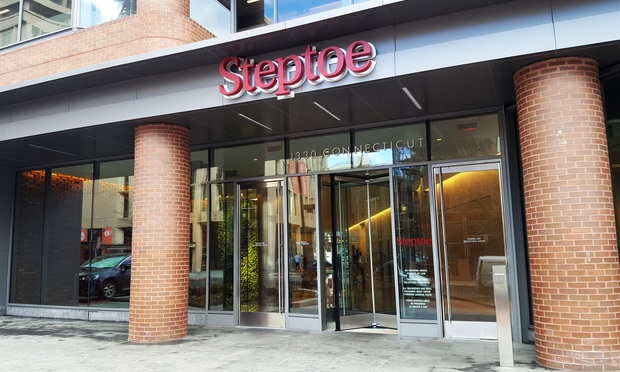Arbiters Pushing for More Disclosure as Litigation Funding Expands Into Their Venue
Arbitration specialists dish on the developments they're seeing as the two worlds collide.
June 19, 2019 at 03:56 PM
4 minute read
 Steptoe & Johnson offices in Washington, D.C.
Steptoe & Johnson offices in Washington, D.C.
Litigation funding and arbitration are colliding on the international stage as the litigation finance industry comes of age.
“There's been an expansion of market entrants that are providing litigation funding,” said Teddy Baldwin, a partner at Steptoe & Johnson in Washington, D.C. “When I first started working with litigation funders 12 years ago, there was a very small number of companies doing this, particularly in arbitration. Now, that number is growing constantly.”
As litigation funding grows deeper roots into arbitration, lawyers are seeing new trends cropping up in the alternative dispute resolution space.
1. More Products Hit the Lit Funding Market
In the past, law firms would give litigation funders a budget for a particular amount of costs and fees, and then the funders would charge some multiple of that to the client upon a successful reward.
“Now because there are so many additional entrants, litigation funders are becoming more specialized in their product offering,”said Baldwin, an expert on international and investor-state arbitration.
Some funders may just take a certain percentage of an award instead, Baldwin said. He's also seen hybrid models, where law firms pay an amount to the funder up front and then another percentage contingency amount for awards that go above that amount. There's also insurance law firms can purchase from funders for an adverse cost award.
➤➤ For all the latest on the future of law, subscribe to What's Next here.
2. Widespread Disclosures
It's not just judges who are getting more curious about lit funding. Arbitrators are also increasingly asking for information on funding.
“A number of arbitral institutions are now changing or looking at changing their disclosure rules,”said Lisa Richman, a partner at McDermott Will & Emery in Washington, D.C., and an international dispute resolution specialist. Richman said cross-border arbitration is an area that's seen an explosion of litigation funding activity.
In response, Hong Kong International Arbitration Center now has disclosure requirements. The Milan Chamber of Arbitration has also changed its disclosure rules, and one of the most prominent investment arbitration institutions, The International Centre for Settlement of Investment Disputes, an affiliate of the World Bank Group, is revising its rules and considering disclosures.
For the most part, the fact that someone is funding litigation, and who that funder is, are the most common disclosures, Richman said. “In arbitration one of the big issues is having an arbitral tribunal that is independent and impartial,” she said. “The thinking behind it has been how would an arbitrator necessarily know that there is this third party that is in a way involved and funding one of the parties.”
3. Deeper Law Firm Ties
As the litigation funding industry evolves, lawyers and funders are becoming more entangled. Funders are developing portfolios where they team up with law firms and agree to be the first place a firm goes for potential funding, Baldwin said.
When law firms enter a portfolio agreement, they have a better chance of getting funded because of that relationship. Funders often also have a set time period to consider portfolio cases. In return, the funder is able to spread out the risk across many different cases.
One of the biggest developments Baldwin sees is that law firms are becoming partners with litigation funders.
“The law firms take some degree of the risk as well, instead of the funders taking 100% of the risk,” he said. “It puts all the parties in a similar place with respect to risk and aligns their interest.”
Funders are also bringing more lawyers in-house because they have a better position to evaluate potential cases to invest in, Richman said.
“Ten years ago, when I was advising clients on this, we were having to do a lot more of the legwork in helping funders with their due diligence,” she said. “Having brought on those skilled practitioners, a number of funders now are able to run that due diligence in house, which I think has lead to greater efficiencies and a more thoughtful conversation.”
This content has been archived. It is available through our partners, LexisNexis® and Bloomberg Law.
To view this content, please continue to their sites.
Not a Lexis Subscriber?
Subscribe Now
Not a Bloomberg Law Subscriber?
Subscribe Now
NOT FOR REPRINT
© 2025 ALM Global, LLC, All Rights Reserved. Request academic re-use from www.copyright.com. All other uses, submit a request to [email protected]. For more information visit Asset & Logo Licensing.
You Might Like
View All
Am Law 100 Lateral Partner Hiring Rose in 2024: Report


Trending Stories
- 1The Law Firm Disrupted: Scrutinizing the Elephant More Than the Mouse
- 2Inherent Diminished Value Damages Unavailable to 3rd-Party Claimants, Court Says
- 3Pa. Defense Firm Sued by Client Over Ex-Eagles Player's $43.5M Med Mal Win
- 4Losses Mount at Morris Manning, but Departing Ex-Chair Stays Bullish About His Old Firm's Future
- 5Zoom Faces Intellectual Property Suit Over AI-Based Augmented Video Conferencing
Who Got The Work
J. Brugh Lower of Gibbons has entered an appearance for industrial equipment supplier Devco Corporation in a pending trademark infringement lawsuit. The suit, accusing the defendant of selling knock-off Graco products, was filed Dec. 18 in New Jersey District Court by Rivkin Radler on behalf of Graco Inc. and Graco Minnesota. The case, assigned to U.S. District Judge Zahid N. Quraishi, is 3:24-cv-11294, Graco Inc. et al v. Devco Corporation.
Who Got The Work
Rebecca Maller-Stein and Kent A. Yalowitz of Arnold & Porter Kaye Scholer have entered their appearances for Hanaco Venture Capital and its executives, Lior Prosor and David Frankel, in a pending securities lawsuit. The action, filed on Dec. 24 in New York Southern District Court by Zell, Aron & Co. on behalf of Goldeneye Advisors, accuses the defendants of negligently and fraudulently managing the plaintiff's $1 million investment. The case, assigned to U.S. District Judge Vernon S. Broderick, is 1:24-cv-09918, Goldeneye Advisors, LLC v. Hanaco Venture Capital, Ltd. et al.
Who Got The Work
Attorneys from A&O Shearman has stepped in as defense counsel for Toronto-Dominion Bank and other defendants in a pending securities class action. The suit, filed Dec. 11 in New York Southern District Court by Bleichmar Fonti & Auld, accuses the defendants of concealing the bank's 'pervasive' deficiencies in regards to its compliance with the Bank Secrecy Act and the quality of its anti-money laundering controls. The case, assigned to U.S. District Judge Arun Subramanian, is 1:24-cv-09445, Gonzalez v. The Toronto-Dominion Bank et al.
Who Got The Work
Crown Castle International, a Pennsylvania company providing shared communications infrastructure, has turned to Luke D. Wolf of Gordon Rees Scully Mansukhani to fend off a pending breach-of-contract lawsuit. The court action, filed Nov. 25 in Michigan Eastern District Court by Hooper Hathaway PC on behalf of The Town Residences LLC, accuses Crown Castle of failing to transfer approximately $30,000 in utility payments from T-Mobile in breach of a roof-top lease and assignment agreement. The case, assigned to U.S. District Judge Susan K. Declercq, is 2:24-cv-13131, The Town Residences LLC v. T-Mobile US, Inc. et al.
Who Got The Work
Wilfred P. Coronato and Daniel M. Schwartz of McCarter & English have stepped in as defense counsel to Electrolux Home Products Inc. in a pending product liability lawsuit. The court action, filed Nov. 26 in New York Eastern District Court by Poulos Lopiccolo PC and Nagel Rice LLP on behalf of David Stern, alleges that the defendant's refrigerators’ drawers and shelving repeatedly break and fall apart within months after purchase. The case, assigned to U.S. District Judge Joan M. Azrack, is 2:24-cv-08204, Stern v. Electrolux Home Products, Inc.
Featured Firms
Law Offices of Gary Martin Hays & Associates, P.C.
(470) 294-1674
Law Offices of Mark E. Salomone
(857) 444-6468
Smith & Hassler
(713) 739-1250









